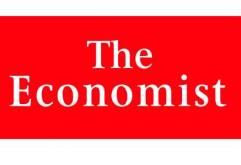- day01-The sharing economy 共享经济(持续更新)
- day02-A bad recession for women 对妇女来说严重的经济衰退
- day03-Human space flight 载人航天
- day04-Climate feedbacks 气候反馈
- day05-Morality 道德
- day06-Viruses and demography 病毒与人口统计学
- day07-Banks and the economy 银行与经济
- day08-Operation Warp Speed 运行翘曲速度
- day09-Satellite navigation 北斗卫星导航系统
- day10-Measuring the poverty pandemic 衡量贫困流行病
- day11-Work-life balance 工作生活平衡
- day12-School closures 关闭学校
- day13-Schools in poor countries 贫穷国家的学校
- day14-Buttonwood Lotus esprit 梧桐莲花
- day15-Caste in India No escape 印度的种姓制度
- day16-Universities from rustbelt to brainbelt 从“铁锈带”到“智力地带”的大学
- day17-TikTok sixty seconds of fame TikTok成名六十秒
- day18-Digital currencies 数字货币
- day19-Migration and Mexico youth departs 移民和墨西哥青年离开
- day20-Space exploration 太空探索
- day21-Free money 免费资金
- day22-The absent student 缺席的学生
- day23-Trumpian TikTok
- day24-Cold cuts 冷切
- day25-Semiconductors 半导体
- day26-Pre-doctoral programmes 博士预科课程
- day27-Artificial intelligence 人工智能
- day28-The decennial census 十年一次的人口普查
- day29-Eating ant eggs in Laos 在老挝吃蚂蚁卵
- day30-Airbus A380 Superjumbo problems 空客A380超大型客机问题
- day31-Gold in India Financial alchemy 印度金融炼金术
- day32-Quantum mechanics 量子力学
- day33-The aliens among us 我们中的外星人
- day34-Silicon Valley v Wall Street 硅谷诉华尔街
- day35-The arctic drill music 北极钻探音乐
- day36-Depopulating the Balkans 巴尔干半岛人口减少
- day37-Unemployment its coming 失业就要来了
- day38-Rule by algorithm 算法规则
- day39-Entertainment a big-sum game 娱乐游戏
- day40-Electric vehicles 电动汽车
- day41-The forgotten problem 被遗忘的问题
- day42-Natural disasters 自然灾害
- day43-Back to school 回到学校
- day44-Japanese politics after Abe 安倍之后的日本政治
- day45-In the name of the mother 以母之名
- day46-The last resort 最后的手段
- day47-French higher education 法国高等教育
- day48-An expensive dream 一个昂贵的梦想
- day49-Housing in Seoul 首尔的住房
- day50-Walking with robots 与机器人一起行走
- day51-Digital ID cards 数字身份证
- day52-NYCs MTA train wreck 纽约市MTA火车失事
- day53-Covid-19 in India 印度的Covid-19
- day54-Dog-walking 遛狗
- day55-Brain-computer interfaces 脑机接口
- day56-Forensic botany 法医植物学
- day57-Psychology Lucid dreams 心理学清醒梦
- day58-Office politics 办公室政治
- day59-Education in Latin America 拉丁美洲的教育
- day60-Railways in Japan 日本铁路
- day61-Vaccines 疫苗
- day62-Natural disasters 自然灾害
- day63-Immunology green shoots 免疫学新芽
- day64-The 2020 campaigns following the money 2020年的竞选活动
- day65-Green machines 绿色机器
- day66-Chipmaking integrating circuits 芯片集成电路
- day67-The database business 数据库业务
- day68-A sniff of life 生命的气息
- day69-Cloud computing 云计算
- day70-Quantum computing 量子计算
- day71-Agriculture in India 印度农业
- day72-The return of the living dead 活死人的归来
- day73-The business of quantum computers 量子计算机业务
- day74-How the other half learns 另一半如何学习
- day75-Scotland in their sights 他们眼中的苏格兰
- day76-Measuring poverty and the poor get poorer 衡量贫困和穷人变得更穷
- day77-Virtual realities 虚拟现实
- day78-Global housing markets 全球房地产市场
- day79-What is real anyway? 到底什么是真的?
- day80-Digital payments 数字支付
- day81-Green innovation 绿色创新
- day82-Busking for bail-outs 为纾困奔波
- day83-State legislatures flipping houses 州立法机构炒房
- day84-MexiCoke 墨西哥可乐
- day85-Indian politics 印度政治
- day86-Street food in Singapore 新加坡的街头美食
- day87-Baby bust baby boom 婴儿潮
- day88-Samsung The Lee way 三星李氏之路
- day89-Luxury with your laptop 笔记本电脑的奢华
- day90-Lunar exploration Watermarked 月球探测水迹
- day91-When every vote counts 每一票都很重要
- day92-Energy chain reaction 能量链式反应
- day93-Rewilding the prairie 野化草原
- day94-The urban-rural divide 城乡分割
- day95-Frogs and princes 青蛙和王子
- day96-Disney the streaming kingdom 迪斯尼流媒体王国
- day97-Materials science 材料科学
- day98-Care in Japan 日本护理
- day99-Cattle rustling in South Africa 南非的偷牛现象
- day100-RCEP 区域全面经济伙伴关系协定
- day101-Inequality in India compounding 印度的不平等加剧
- day102-Ungulates in Japan hungry for visitors 日本蹄类动物渴望游客
- day103-The Brexit endgame 英国脱欧终局
- day104-The ABC of the euro zone 欧元区的基础知识
- day105-Indias market rally 印度股市反弹
- day106-Computational biology 计算生物学
- day107-Space flight 太空飞行
- day108-Sustainable fishing 可持续渔业
- day109-Will inflation return?通货膨胀会卷土重来吗?
- day110-Brexit trade negotiations 英国脱欧贸易谈判
- day111-Transgender medicine 变性医学
- day112-Big tech and antitrust 大技术与反垄断
- day113-Self-driving cars spinning off 自动驾驶汽车剥离
- day114-Sonic warfare 声波战
- day115-Gene therapy 基因治疗
- 116-The plague year 瘟疫年
- 117-Covid-19 in New York 纽约的新冠疫情
- 118-Cyber security 网络安全
- 119-Cinema and streaming 电影和流媒体
- 120-Data storage 数据存储
Day 11
China is not an easy place to work, and, in clothing at least, Chinese consumers tend to revere brands. But even the label-obsessed need plain bits and bobs for layering or co-ordination.
本句主要讲优衣库在中国市场的境况,以及中国消费者的购物喜好。China is not an easy place to work,中国市场不容易做,或者我们说(外国品牌)要打开中国市场不容易。这里特指的是服饰行业in clothing at least。表示至少在服饰行业是这样的。
其原因?Chinese consumers tend to revere brands.
revere /rɪˈvɪə/
表示尊敬;崇敬,同意替换词:respect/ admire/ honor/ worship
常用搭配be revered as…被尊为…
如,他被尊为民族英雄。我们可以说:
He is revered as a national hero.
句中的revere brands可以翻译成崇尚品牌。
也就是说:由于中国消费者倾向于崇尚品牌,中国市场不容易打开,至少对于服饰行业是如此。那么,国外品牌(优衣库)在中国就没市场了吗?后面一句,but可见,并非如此。
But even the label-obsessed need plain bits and bobs for layering or co-ordination.
label-obsessed:adj.由label和obsessed合成,沉迷品牌的。这里the+adj.表示一类人,如the young指年轻人;the wealthy指富人;句中the label-obsessed指沉迷品牌的人。
bits and bobs (常用口语)指七零八碎,零碎的东西/事情。类似还有bits and pieces、odds and ends
如,旅行前要整理好一些零零碎碎的东西。我们可以说:
I am going to sort out some bits and bobs before I go on holiday tomorrow.
layering(层叠)和co-ordination(配合),在表示服饰穿着时指“叠穿”(见图)和“搭配”。也就是说中国消费者可能追求名品,但对于用于叠穿和搭配的服饰,选择较朴素和平价的就可以了。可能就会选择优衣库里面的衣服。
翻译:
中国消费者倾向于崇尚名牌,要打开中国市场并不容易,至少在服饰行业是这样。但即便是沉迷名牌的人也需要一些平价、朴素的服饰来叠穿或者做搭配。
Day 12
The exuberant private sector has been stifled; its share of output has stagnated, and firms must establish party cells which then may have a say over vital hiring and investment decisions.
这个句子在讲private sector(私营部门,即私营企业firm)发展受抑制,且受party的干预过多。修饰private sector的定语是exuberant /ɪɡˈzjuːbərənt/丰富的;茂盛的;充满活力的。这是过去私营部门的发展情况,the exuberant private sector可翻译成蓬勃发展的私营部门。
如今,私营企业发展受抑制,句中体现在…has been stifled, …has stagnated。构成押韵。stifle和stagnate的意思相近,都表示抑制、停滞不前,可以成对记忆。
stifle /ˈstaɪfəl/: to stop sth from happening or developing
如,stifle innovation/ creativity 压制创新
stifle the unrest 抑制动乱
也可以用来表示压抑、强忍住…某种情感。
如,stifle a yawn/ smile/ grin etc
它的形容词stifling用来形容闷的、令人透不过气 的。
It is stifling in the room. 房间里闷得人难受。
He found life stifling. 他感觉生活令人窒息。
stagnate /stæɡˈneɪt/: to stop developing or making progress
句中the share of output has stagnated表示产出的比例停滞不前。
have a say in/on/over…表示对…有发言权,其主语是party cells(party组织)。它对企业内部的vital hiring(重要招聘)和 investment decisions(投资决策)都有发言权。
注意say这个小词,用作名词表决定权、发言权。
比如,谁最后说了算。我们可以说:Who has the finial say?
对…我们需要有更大的发言权
We want a greater say in …
在决定出售公司的问题上,我们没有发言权。
We had no say in the decision to sell the company.
Have your say 是习语,表示充分发表意见;说出心里话
She won’t be happy until she’s had her say.
她要把话都说出来才舒畅。
翻译:
蓬勃发展的私营部门受到抑制,占经济产出的比例停滞不前。企业必须建立党组织,而党组织可能在重要的招聘和投资决策上有发言权。
Day 13
In Beijing, I once met the small community of westerners who had cracked Mandarin.
看下这个外刊用词,crack 常见的作为名词(裂缝);作为动词(裂开)。Here,crack Mandarin中crack用作动词,显然不能作为“裂开”来理解。
Atcually, crack有一个意思是:to find the solution to a problem or to find the way to do sth difficult。Mandarin(普通话)对于westerners(西方人)来说,绝对是something difficult的。那crack Mandarin就相当于find the way to deal with Mandarin. 攻克了普通话,也就是熟练掌握了这门语言。
所以,我们可以用crack a language来表示:掌握一门语言。
另外,相似的用法还有:
crack the problem 解决问题
crack the code 破译密码
crack the case 侦破案件
老外对于crack这个词有很多的活用,我们可以看例句感受下:
My lips were dry and cracked.
我的嘴唇干裂。
She cracked an egg into the pan.
她在锅里打了一个鸡蛋。
Her face cracked into a smile.
她脸上绽放了笑容。
You will crack up if you carry on working like this.
你再这样干下去,身体会垮掉。
He walked in and everyone just cracked up.
他一进来,人人都捧腹大笑起来。
Time was cracking on and we were nowhere near finished.
时间飞逝,可我们却远远没有完成。
crack还常用于一些口语表达中:
crack it 做成某事
我想我们成功了。可以说:
I think we have cracked it! / I think we have got it cracked!
crack a joke 说笑话
他老是拿我的长相开玩笑。可以说:
He kept cracking jokes about my appearance.
get cracking 立即大干起来
要做的事情很多,咱们马上行动吧。可以说:
There is a lot to be done, so let’s get cracking.
句中,the small community of westerners(指一小群西方人),他们已经cracked Mandarin(熟练掌握普通话了)。理解正确了crack这个词,这句翻译就很容易啦:
在北京,我曾见过一小群熟练掌握普通话的西方人
Day 14
Citizens may enjoy the fruits of economic growth but may not protest against the costs, from pollution to yawning inequality.
本句一个转折连词but连接了citizens(公民)能做的事enjoy the fruits of economic growth(享受经济增长的成果)和不能做的事protest against the costs(抗议其所带来的代价)。后面from pollution to yawning inequality是对于costs的补充说明。
具体来看下里面的这个外刊用词yawn。看到yawn我们就会浮现一个打哈欠的画面吧,stretch and yawn(伸懒腰、打哈欠),这是yawn最常用的意思。但套用在此处显然不合适。yawning inequality,yawn的动词ing形式作定语修饰inequality,是怎样的一种不平等性呢?
此处,yawn: to be very wide and often frightening and difficult to get across. 我们常用a yawning gap/ gulf/ chasm来表示巨大的鸿沟。
比如,巨大的贫富差距,我们可以说:
The yawning gap between the rich and the poor.
句中的yawning inequality,就是巨大的不公平性,或者说日益增长的不公平。
另外,yawn还能用作n.
1. 表哈欠 如stifle a yawn 忍住不打哈欠(stifle前面刚讲过哦)
2,常用a yawn来指代无聊乏味的人/事情
如:The meeting was a big yawn from start to finish
这个会议至始至终都很无聊。
翻译:
公民可以享受经济增长的成果,但不可抗议其代价,无论是污染还是日益增长的不平等。
Day 15
Some foreign observers find it easy to explain China’s relative gloom.
这个句子不难理解跟翻译,主要想讲讲gloom这个词和它的两个常用习语。
gloom 用作名词,表示悲观、愁闷。形容词是gloomy。
如,愁眉苦脸,我们可以说:
an expression of gloom
a gloomy expression
with gloomy looks on the face
它的两个常用习语:
我们可以用doom and gloom来表达一种悲观失落的情绪(a feeling of having lost all hope),或用来描述前景黯淡(to have a bleak prospect)。同样,可以写成gloom and doom。
即便明显受挫,但对我们来说绝非胜利无望。我们可以说:
Despite the obvious setbacks, it is not all doom and gloom for us.
另外,pile on the gloom常用来表示雪上加霜(make unpleasant situation worse)。类似的还有pile on the agony/ add insult to injury
比如,你对她说的话等于是雪上加霜,我们可以说:
What you said to her is to pile on the gloom/ agony.
What you said to her is to add insult to injury
翻译:
一些外国观察者认为,中国相对悲观的情绪很容易理解。
Day 16
A City broker had to be at his desk, and with his wits about him, when the New York market opened just after lunchtime in London.
这个句子我们先来看when后面的内容,主要在讲纽约的股市(the New York market)开市时间在伦敦的午餐之后(after lunchtime in London)。这里,when引导的时间状语从句后置,翻译成中文应提到前面来。
然后看本句的主语A City broker,注意这里的city首字母是大写的。the City: Britain’s financial and business center, in the oldest part of London. 专指伦敦的金融城、金融界(伦敦最古老的金融商务中心)。a City broker就是金融城的证券经纪人。他们要做的事情是: 1, had to be at his desk;2, with his wits about him.
习语:with your wits about your或者have/keep your wits about your: be aware of what is happening and ready to think and act quickly 时刻保持头脑冷静;随机应变。这里也就是指工作人员要坐在办公桌前,开始办公,进入工作状态了。
另外,我们可以用be at one’s wits end来形容人志穷计尽。
翻译:
纽约的开市时间就在在伦敦午餐时间之后,而此时金融城里的经纪人必须回到办公桌前,进入工作状态。
Day 17
And a host of tax cuts and other measures are in train to pep up China’s slowing economy.
这个句子看三个短语:
a host of: a large number of表示大量、许多。其中,host:1.主人(女主人hostess)如,host family寄宿家庭;房东 2. 东道主,如host country 东道国;host city主办城市 3. 主持人,类似presenter;anchorperson;compere。
如,杭州将成为2022年亚运会的主办城市。我们可以说:Hangzhou will be the host city of the 2022 Asian Games.
be in train: it means be prepared for things to start 准备就绪,(陆续)准备好了。如, Everything is in train now, we can begin! 一切已经准备就绪,我们可以开始了。句中tax cuts and other measures are in train指得就是减税等一系列措施已准备就绪、可以陆续推出了。
pep up: to make sb/sth more interesting or full of energy 增加…趣味;使活跃;刺激。同义替换短语,我们可用spice up;liven up;jazz up
如,在清新空气中散散步会使你精神振奋。A walk in the fresh air will pep you up.
比赛中的啦啦操(cheerleading)就是用来活跃氛围的(pep up the atmosphere)。见图。
句中pep up China’s slowing economy,翻译成“刺激”更为恰当,刺激正在放缓的经济。
翻译:
并且,中国将陆续推出减税等一系列措施,来刺激正在放缓的经济。
Day 18
The old City of public-school amateurism, late starts, early finishes and long, boozy lunches disappeared. In its place, a new City emerged under the sway of American investment banks.
the City前面刚讲过,指:Britain’s financial and business center, in the oldest part of London.伦敦的金融城、金融界(伦敦最古老的金融商务中心)。the old City指老派金融城;后文的the new City指新派金融城。两者前后形成对比。
英国的public school(公学) 跟我们概念中的公立学校是不一样的。它指的是英国的公共学校,公学部分与皇室有关,另外是由一些较富有的社会人士设立,为其子女提供教育。此类学校入学的基本条件并不是学费,而是家庭背景。此处public-school是一个复合词,作定语修饰amateurism,表示公学范儿的、非追逐利益的。
amateurism /ˈæmətjərɪzəm / n. 业余主义。它的词根是amateur: 1. adj. 表业余的、业余爱好的(反义:professional)。业余摄影爱好者,我们可以说:an amateur photographer 2. n. 表示业余爱好者、外行。职业选手和业余选手,我们可以说:professionals and amateurs。
long, boozy lunches表示无酒不欢的悠长午餐。boozy /ˈbuːzɪ/: involving a lot of alcoholic drink, 比如嗜酒的人,我们可以说a boozy person;酒友,a boozy friend。同义替换词:liquorous;bibulous。酗酒者,常用alcoholic(酒鬼);对应的,烟瘾重的人,可表达成a chain smoker(老烟枪)。
in its place在这里表示取而代之,可用instead替换。要表达取代,我们还可以说sth is giving way to或者sth is replaced/ superseded by…
under the sway of 相当于under the influence/power of,表示在…的影响下。如,在朋友影响下,他改变了自己的看法:He changed his opinion under the sway of his friends.跟sway相关的另一个常用短语,hold sway,表示支配、统治。如传统广告形式仍占支配地位:The older forms of advertising still hold sway.
翻译:
那种有着公学范儿的业余主义的、开工晚、收工早,以及吃着无酒不欢的悠长午餐的老派金融城消失了。取而代之的是受美国投资银行影响而出现的新派金融城。
每天坚持精读一句外刊,一年后会有怎样的效果?让我们一起见证累积的力量!那些让你现在战战兢兢的外刊牛刊,可能也就那么回事儿。
贵在坚持。毕竟,阅读积累就是件细水长流的事。你花在这里的精力,都不会白费,因为,时间看得见!


